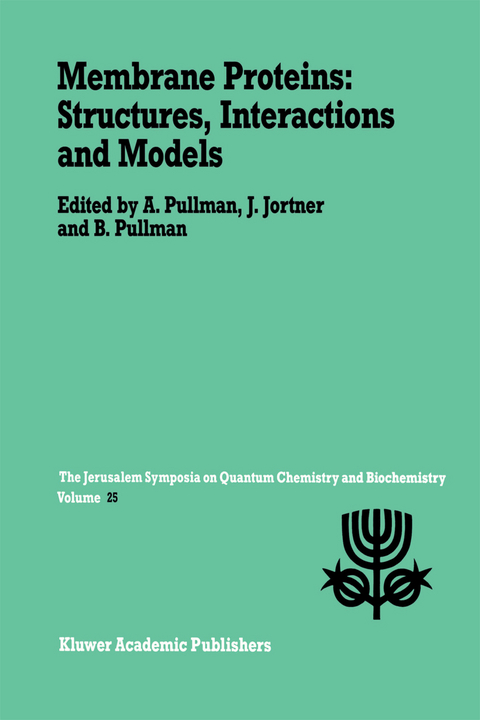
Membrane Proteins: Structures, Interactions and Models
Springer (Verlag)
978-94-010-5205-4 (ISBN)
Electron Crystallography of Membrane Proteins 1.- High-Resolution Electron Microscopy of Membrane Proteins.- Distinguishing Transmembrane Helices from Peripheral Helices by Circular Dichroism.- High-Resolution NMR of Membrane Proteins: the Example of Bacteriorhodopsin.- Molecular Dynamics Simulations of Bacteriorhodopsin.- Dynamics of Bacteriorhodopsin Studied by Neutron Scattering: Effects of the Environment, Softness and Structure.- What do Neutrons, X-Ray Synchrotron Radiation, Optical pH-Indicators, and Mutagenesis tell us about the Light-Driven Proton Pump Bacteriorhodopsin ?.- From Time-Resolved Difference Spectra to Kinetics, Mechanism, and Thermodynamics in the Bacteriorhodopsin Photocycle.- Arginine 175 is Part of an Anion Binding Site in Bacteriorhodopsin.- Electrostatic Calculations of the pKa’s of Ionizable Groups in Bacteriorhodopsin.- Dimerization of Glycophorin A Transmembrane Helices: Mutagenesis and Modeling.- The Nicotinic Acetylcholine Receptor, a Model of Ligand-Gated Ion Channels: Investigation of its Functional Organization by Protein Chemistry and Site-Directed Mutagenesis.- Molecular Evolution of the Binding Site of the Nicotinic Acetylcholine Receptor.- 3-D Structure of Acetylcholinesterase and Complexes of it with Anticholinesterase Agents.- Modelling and Mutagenesis of Butyrylcholinesterase Based on the X-Ray Structure of Acetylcholinesterase.- The Nicotinic Acetylcholine Receptor and its Lipid Microenvironment.- A Correlation Between Patch Clamp and Fluorescence Anisotropy Experiments to Study Alterations on the Acethylcholine Channel Induced by Cholesterol Enrichment in Chick Myocytes.- Interaction of the Nicotinic Acetylcholine Receptor with Ligands and Membrane Lipids Studied by Fourier-Transform Infrared Spectroscopy and PhotoaffinityLabeling.- On the Complexation of the Methylammonium Ion by Aromatic Side Chains of Proteins.- The Inhibitory Glycine Receptor: Structure-Function Studies on a Neuronal Chloride Channel.- Determinants of Ligand Binding to the Inhibitory Glycine Receptor.- Channel Proteins: from Anatomy to Design.- Linking Permeation Behavior and Structure of Ion Channels with a Microscopic Model.- Molecular Structure-Function Relations in Voltage-Gated Ion Channels of Excitable Membranes.- A Novel Model for Saturation of Ion Conductivity in Transmembrane Channels.- Computational Approaches to Understanding the Ion Channel-Lipid System.- A Minimal Model of Ion Channels: Polyamino Acids in Liposomes.- Structure and Dynamics of Melittin in Solution and Membranes from Amide Hydrogen Exchange Analysis.- Computer Modelling of Ion Binding Sites in Proteins.- Sec-Dependent and Sec-Independent Mechanisms of Protein Insertion into Bacterial Membranes.- Puncturing Cell Membranes: Comparison of Colicin A and Aerolysin.- Structure-Function Relationships in the Membrane Channel Porin as Based on a 1.8 A Resolution Crystal Structure.- Molecular Mechanism of Action of Pore-Forming Colicins and of their Immunity Proteins.- Preliminary Structural Studies of Photosystem I.- Problems and Progress in Computational Approaches to the Molecular Basis of Recognition.- Assembly of Escherichia Coli Inner Membrane Proteins: Sec-Dependent and Sec-Independent Membrane Insertion.- Molecular Dynamics Simulations of Phospholipid Membranes and their Interaction with Phospholipase A2.- Electron Transfer in Bacterial Photosynthetic Reaction Centers.- Proton Transfer Pathways in Photosynthetic Reaction Centers Studied by Site-Directed Mutagenesis.
| Reihe/Serie | Jerusalem Symposia ; 25 |
|---|---|
| Zusatzinfo | X, 506 p. |
| Verlagsort | Dordrecht |
| Sprache | englisch |
| Maße | 160 x 240 mm |
| Themenwelt | Naturwissenschaften ► Biologie ► Biochemie |
| Naturwissenschaften ► Biologie ► Mikrobiologie / Immunologie | |
| Naturwissenschaften ► Biologie ► Zellbiologie | |
| Naturwissenschaften ► Chemie ► Physikalische Chemie | |
| ISBN-10 | 94-010-5205-0 / 9401052050 |
| ISBN-13 | 978-94-010-5205-4 / 9789401052054 |
| Zustand | Neuware |
| Informationen gemäß Produktsicherheitsverordnung (GPSR) | |
| Haben Sie eine Frage zum Produkt? |
aus dem Bereich


